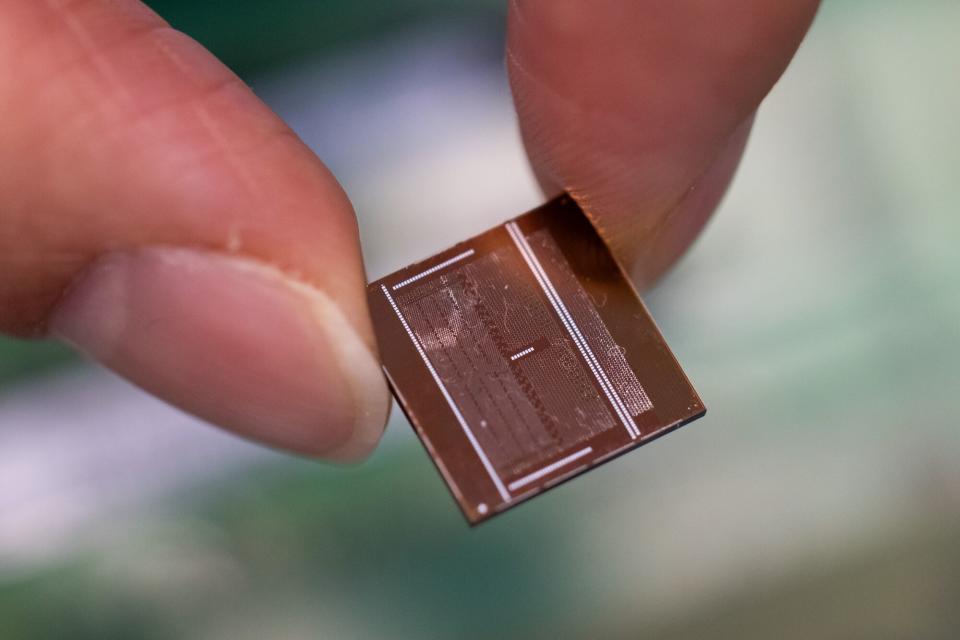US Weighs Restrictions on China’s Access to AI Memory Chips

(Bloomberg) -- The US is considering unilateral restrictions on China’s access to AI memory chips and equipment capable of making those semiconductors as soon as next month, a move that would further escalate the tech rivalry between the world’s biggest economies.
Most Read from Bloomberg
Singer Akon’s Multibillion-Dollar Futuristic City in Africa Gets Final Notice
The 5 Coastal States That Face the Most Devastating Flood Risk
Paris Spent €1.4 Billion to Clean Up the Seine. Has It Worked?
New York City’s Outdoor Dining Sheds Will Start Disappearing
The measure is designed to keep Micron Technology Inc. and South Korea’s leading memory chipmakers SK Hynix Inc. and Samsung Electronics Co. from supplying Chinese firms with so-called high-bandwidth memory, or HBM, chips, according to people familiar with the matter, who emphasized that no final decision has been made. The three firms dominate the global HBM market.
The Biden administration is working on several restrictions aimed at keeping vital technology out of the hands of Chinese manufacturers, including limits on sales of chipmaking equipment. This rule would deliver a new set of constraints against memory chips for artificial intelligence, the latest arena of US-China competition.
If enacted, the measure would capture HBM2 and more advanced chips including HBM3 and HBM3E, the most cutting-edge AI memory chips being produced right now, the people said, as well as the tools required to make them. HBM chips are required to run AI accelerators like those offered by Nvidia Corp. and Advanced Micro Devices Inc.
Micron would largely be unaffected as the Boise, Idaho-based chipmaker has refrained from selling its HBM products to China after Beijing banned its memory chips from critical infrastructure in 2023, the people said. They spoke on condition of anonymity to discuss sensitive government information.
It’s unclear what authority the US would use to restrict the South Korean firms, the people said. One possibility is the foreign direct product rule, or FDPR, which lets Washington impose controls on foreign-made products that use even the tiniest amount of American technology. Both SK Hynix and Samsung rely on US chip design software and equipment from the likes of Cadence Design Systems Inc. and Applied Materials Inc.
Through a spokesperson, the Commerce Department said in a statement that it’s “continually assessing the evolving threat environment and updating our export controls, as necessary, to protect US national security and safeguard our technological ecosystem. We remain committed to working closely with our allies who share our values.”
Micron, Samsung and SK Hynix representatives declined to comment.
China said it firmly opposes US efforts to suppress China’s semiconductor industry and accused Washington of violating international trade rules.
“US measures won’t stop China’s technological progress and will only encourage Chinese enterprises to become self-reliant,” a spokesperson for the Chinese Ministry of Foreign Affairs said in response to an inquiry from Bloomberg.
The new restrictions are likely to be unveiled as soon as late August as part of a broader package that also includes sanctions against more than 120 Chinese firms and fresh limits on various types of chip equipment, with carve-outs for key allies including Japan, the Netherlands and South Korea, the people said. That means the equipment measures would primarily target US companies.
President Joe Biden’s administration has already asked Seoul to rein in exports of chip technology to China, with a focus on manufacturing equipment, and adopt controls similar to those the US has already implemented, Bloomberg News has reported.
Separately, the US has been pressuring Japan and the Netherlands — home to two of the most important semiconductor equipment companies — to stop those firms from servicing restricted gear that’s already in China, as reported earlier by Bloomberg.
While the new measures would curb direct sales of HBM chips to Chinese companies, it’s unclear whether high-end memory chips bundled together with AI accelerators would be allowed for sale in the Asian nation. Samsung is now supplying HBM3 for Nvidia’s H20 chips, a less powerful AI accelerator that has been cleared for Chinese firms, Bloomberg News has reported.
As part of its comprehensive HBM-related curbs in the same export control package, the US plans to lower the threshold for what qualifies as advanced dynamic random access memory, or DRAM. A single HBM chip contains several DRAM dies.
What Bloomberg Intelligence Says
SK Hynix’s revenue of high bandwidth memory (HBM) chips could have a very limited impact from potential export restrictions by US government. SK Hynix’s HBM are mostly used with Nvidia’s most high-end GPUs, which are already restricted to be exported to China. Samsung may also have a limited impact, as its HBM sales are still too small to affect overall sales.
— Masahiro Wakasugi, senior industry analyst
New restrictions on HBM equipment and DRAM aim to deter leading Chinese memory chipmaker ChangXin Memory Technologies Inc. from advancing its technology, according to some of the people. CXMT is now capable of making HBM2, which first became commercially available in 2016.
Biden administration officials also plan to create a list of the critical components that China needs to keep producing semiconductors. They’re also eyeing what’s called a zero de-minimis rule, an even tighter standard for FDR under which any products containing US technology would be subject to potential restrictions. A large group of US allies will be exempted from that measure, include Japan and the Netherlands.
Huawei Technologies Co. is now offering its Ascend AI chips as an alternative to products from Nvidia and AMD just as Beijing seeks to bolster self-sufficiency in critical technologies in response to tighter US restrictions. However, it is unclear who supplies Huawei with the HBMs that are bundled with its Ascend chips.
--With assistance from Ian King, Yoolim Lee and Philip Glamann.
(Updates with China’s response after 8th paragraph.)
Most Read from Bloomberg Businessweek
©2024 Bloomberg L.P.